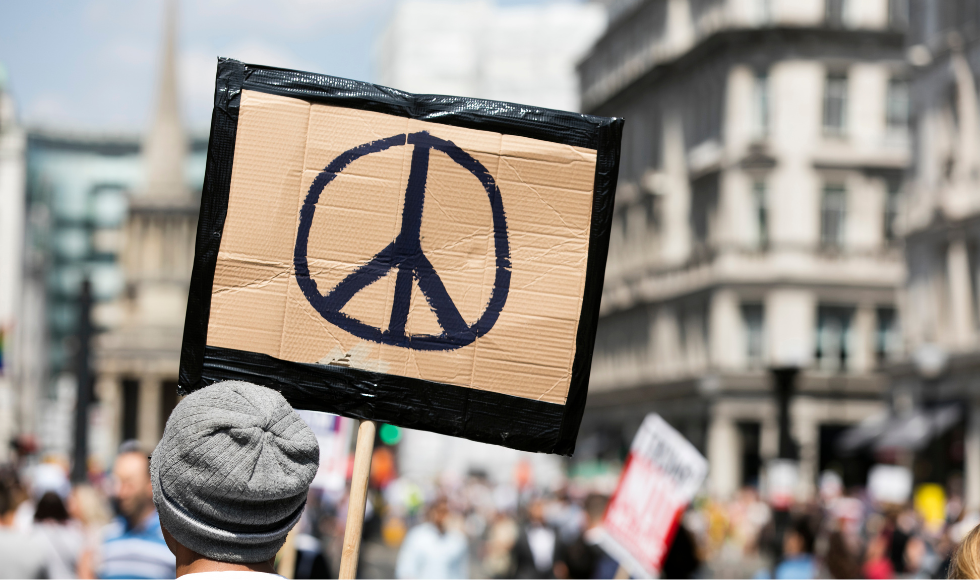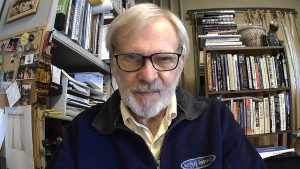Why McMaster Donors Give: Institutions are the key to nonviolence, Charles Collyer says

McMaster alumnus Charles Collyer, a longtime nonviolence educator, activist and supporter of McMaster's Global Peace and Justice program, has established a fund in that program to enrich the student experience.
What comes to mind when you think of nonviolence?
You might think of people who have championed that approach — icons like Gandhi and Martin Luther King, Jr. Or you might think of their tactics: sit-ins, hunger strikes, freedom rides.
You probably don’t think about the less exciting, everyday work of mediation at a university.
But for 1971 McMaster grad Charles Collyer, dealing with that kind of conflict resolution showed him that nonviolence is everywhere — but hardly anyone was talking about it that way.
This realization took his career in a new direction, and brought him back into contact with Mac, where he has become a fervent supporter of the Global Peace and Social Justice (GPSJ) program.

“I was originally an experimental psychologist, but I turned into a nonviolence educator in the ’90s,” says Collyer, who graduated from McMaster with a bachelor’s degree in psychology before studying at Princeton.
“It just kind of tickled me that Mac had become interested in peace studies around the same time I did. I thought more places ought to do that.”
At the time of his conversion from psychologist to nonviolence teacher, Collyer had been promoted to chair of the psychology department at the University of Rhode Island (URI). Finding himself frequently tied up in conflict resolution, he participated in nonviolence training that was being offered to police officers in Providence.
That training came from someone with unimpeachable experience in nonviolence: Bernard Lafayette had been a prominent activist in the civil rights movement as a Freedom Rider, a member of the Student Nonviolent Coordinating Committee, and one of the organizers of the Selma-to-Montgomery marches.
“Lafayette taught us things we had never known,” Collyer says. “It was inexcusable that American schools were not teaching the connection between nonviolence and the achievements of the civil rights movement.”
Collyer made it his mission to correct this oversight. He helped establish the Centre for Nonviolence and Peace Studies at URI and hired Lafayette as its founding director — a living link to the civil rights movement and its principles of nonviolence.
When he heard about the Global Peace and Social Justice program at his alma mater, he was impressed that McMaster had taken up the cause. “My interest in nonviolence is not that of a traditional, radical, leftist revolutionary,” he says. “That’s not where I am.”
“I’m an institutionalist: I believe the institutions of society themselves are instruments of nonviolence.”
Since then, he has become a regular donor to the GPSJ. He established the Charles Collyer Global Peace and Social Justice Fund; true to his belief in institutions, he has given little direction on how his gifts are spent.
“I’ve been a department chair, so I know how useful it is to have some money available beyond the usual budget that allows you to do things on short notice for students.”
Collyer says this could be anything from sending students to conferences or bringing in guest speakers. “It’s meant to help enrich the student experience.”
The fund offers “a huge opportunity” for McMaster students, says Chandrima Chakraborty, director of the Global Peace and Social Justice program.
“A fund like this frees us to support whatever bright ideas students bring us — and there are many. We’re endlessly grateful to Charles for supporting this program and proud to call him an alumnus and a friend.”
The fund is just one of Collyer’s ways of giving back. He is also an annual donor to the university and has established a gift to McMaster in his will.
His focus on the student experience is a hallmark of Collyer’s work, both as an educator and as a supporter. In his eyes, students aren’t taught about nonviolence, and they end up believing in dangerous, simple ways of thinking.
“Students’ whole approach to conflict resolution is ‘If someone hits you, you hit them back.’ Students sometimes come all the way to college with that mindset. They need more than that if they’re going to function in a complex environment.”
By teaching nonviolence at Rhode Island and on his YouTube channel, and supporting it at McMaster, Collyer hopes to be part of a larger shift, where people realize and appreciate the centrality of nonviolence.
“I’ve been hearing all my life that there’s been a lot of progress in science and tech, but very little in human affairs. I don’t think that’s true,” he says.
“I think Gandhi produced a change comparable to Copernicus; we just haven’t learned how to process it and teach it yet. I think that’s coming.”
Why McMaster Donors Give: At McMaster University, every single donation, no matter the size, has the potential to make a difference in the lives of our students, the quality of our research and our ability to give back to our community and influence the future. We asked some of our donors what motivates them to give. These are their stories.

